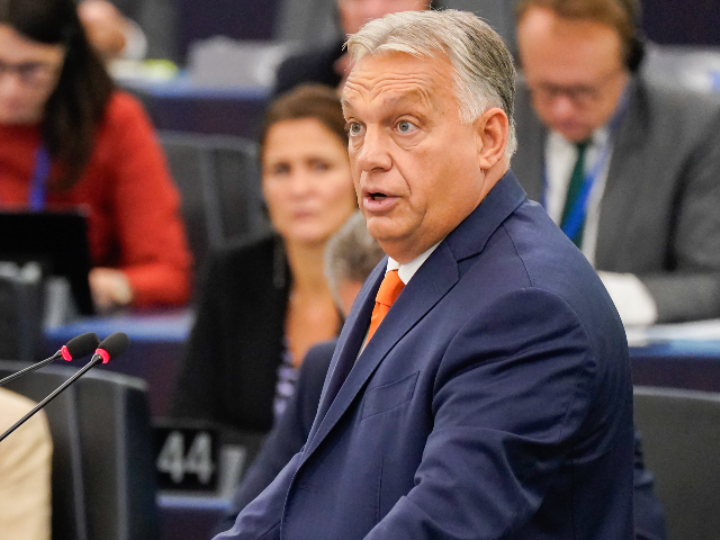by Giles Merritt*
The question is, how far will Europe step in to limit the damage?
Re-branded as ’emerging markets’ when their fortunes were improving a decade or so ago, they are back to square one. The least-developed nations, especially those of sub-Saharan Africa, are worst hit and find themselves squarely in Trump’s cross-hairs. He has all but closed USAID, the federal government’s development arm, and is withdrawing from the World Health Organisation and the Paris Climate Agreement.
Trump’s assaults will undo half a century of international development efforts. Rich countries may not have been as generous as they might in helping poverty-stricken former colonies, but they have never acted with Trump’s vicious disregard.
‘America First’ is creating both a responsibility and an opportunity for Europe. Responsibility as it is in no one’s interest to see substantial parts of Africa, Asia and central and southern America descend into anarchy. Opportunity because it offers Europe a rallying cause for defying Trump in a constructive way that can also recover the ground it has lost in terms of global influence.
The developing world hasn’t lately been much in the headlines, thanks to the Ukraine war, the Israel-Palestine conflict and, latterly, Trump’s venomous MAGA strategy at home of authoritarianism and enrichment. Pushed to the sidelines, poorer countries are suffering from spiralling debt and dwindling inward investments.
The interest that heavily indebted countries pay to service their borrowings is crushing. About half of humankind lives in countries where interest payments to foreign creditors equal spending on healthcare and education – the two areas that determine their future competitiveness. Europe’s response to this has so far come from Rome rather than Brussels; shortly before he died, the late Pope Francis launched a ‘jubilee committee’ to champion debt forgiveness.
Investment projects that are vital to modernising post-colonial economies have gone in the opposite direction to debt mountains. World Bank analysts say foreign direct investment in these countries today runs at half the peak levels of 2008. UNCTAD, the UN’s development arm, says only a tiny 3.5 per cent of the global investment projects worth $1.3 trillion a year go to Africa.
Trump’s trade wars are hammering sharp new nails into the coffin of development assistance. The weak GDP growth that poorer countries had achieved is being savagely reduced by the global slowdown. “Outside of Asia,” the World Bank’s chief economist recently commented, “the developing world is becoming a development-free zone.”
How willing and able is the EU to take up the slack? The European Commission’s outward message is positive, but internally the signals are less encouraging. The ‘Golden Gateway’ initiative has promised €300bn in intelligently targeted projects for 2021-27, with half earmarked for Africa. The Commission’s website trumpets that EU spending accounts for 42% of development aid worldwide, way ahead of the pre-Trump US share of 30%.
Many development experts agree that EU aid is more transparent and less self-serving than American projects often ‘aligned with US interests’. But with money increasingly short, and EU governments less open to geo-political arguments about Europe’s international role, there are fears that Brussels will be stepping backwards instead of filling the gaps left by Donald Trump.
Jozef Sikela, the Czech investment banker-turned-politician who joined the Von der Leyen II Commission to take responsibility for ‘international partnerships’, is reportedly planning to switch Europe’s aid spending towards a more US or UK-style emphasis on critical raw materials and energy projects. NGOs have warned that this risks undermining the quality of EU development assistance.
Debate over these details will doubtless rage when development policies are reviewed as part of negotiations over the EU’s 2028-34 budget – the Multi-annual Financial Framework (MFF). It remains to be seen how well the case for more aid spending will stand up against funding Ukraine and a host of the EU’s own economic and social pressures.
There is nevertheless a compelling case for substantial increases in member states’ current financial contributions. Because of COVID-19 and then Ukraine, these will total approaching €2tn over the present MFF’s seven years, but that has to be set against a collective EU GDP for the same period of more than €100tn.
Africa and other underdeveloped regions of the world will be the litmus test of Europe’s heft in the world. The EU’s declining power is laid embarrassingly bare by Trump’s ruthless use of America’s strengths. Although he is leading his own country and much of the world into great danger, that doesn’t absolve Europe’s leaders from making a huge effort to repair the damage and to recover the EU’s fading influence. Now is the moment to get back on the right side of history.
*Founder of Friends of Europe
**first published in friendsofeurope.org



![Although [Trump] is leading his own country and much of the world into great danger, that doesn’t absolve Europe’s leaders from making a huge effort to repair the damage and to recover the EU’s fading influence.](/articlefiles/trump___3_.png)
 By: N. Peter Kramer
By: N. Peter Kramer
